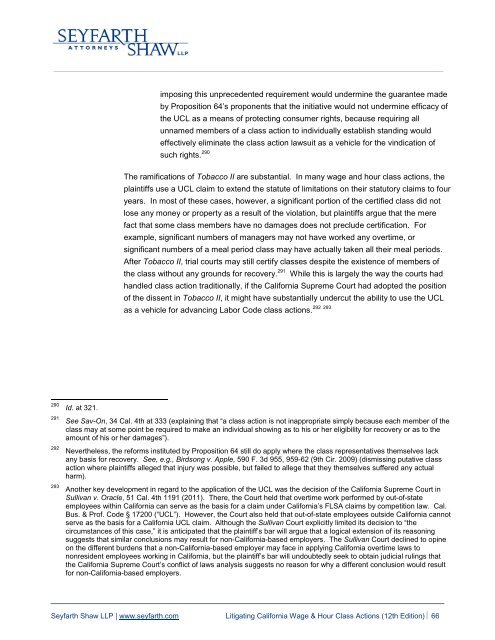Litigating California Wage & Hour and Labor Code Class Actions
Litigating California Wage & Hour and Labor Code Class Actions
Litigating California Wage & Hour and Labor Code Class Actions
Create successful ePaper yourself
Turn your PDF publications into a flip-book with our unique Google optimized e-Paper software.
imposing this unprecedented requirement would undermine the guarantee made<br />
by Proposition 64’s proponents that the initiative would not undermine efficacy of<br />
the UCL as a means of protecting consumer rights, because requiring all<br />
unnamed members of a class action to individually establish st<strong>and</strong>ing would<br />
effectively eliminate the class action lawsuit as a vehicle for the vindication of<br />
such rights. 290<br />
The ramifications of Tobacco II are substantial. In many wage <strong>and</strong> hour class actions, the<br />
plaintiffs use a UCL claim to extend the statute of limitations on their statutory claims to four<br />
years. In most of these cases, however, a significant portion of the certified class did not<br />
lose any money or property as a result of the violation, but plaintiffs argue that the mere<br />
fact that some class members have no damages does not preclude certification. For<br />
example, significant numbers of managers may not have worked any overtime, or<br />
significant numbers of a meal period class may have actually taken all their meal periods.<br />
After Tobacco II, trial courts may still certify classes despite the existence of members of<br />
the class without any grounds for recovery. 291<br />
While this is largely the way the courts had<br />
h<strong>and</strong>led class action traditionally, if the <strong>California</strong> Supreme Court had adopted the position<br />
of the dissent in Tobacco II, it might have substantially undercut the ability to use the UCL<br />
292 293<br />
as a vehicle for advancing <strong>Labor</strong> <strong>Code</strong> class actions.<br />
290<br />
291<br />
292<br />
293<br />
Id. at 321.<br />
See Sav-On, 34 Cal. 4th at 333 (explaining that “a class action is not inappropriate simply because each member of the<br />
class may at some point be required to make an individual showing as to his or her eligibility for recovery or as to the<br />
amount of his or her damages”).<br />
Nevertheless, the reforms instituted by Proposition 64 still do apply where the class representatives themselves lack<br />
any basis for recovery. See, e.g., Birdsong v. Apple, 590 F. 3d 955, 959-62 (9th Cir. 2009) (dismissing putative class<br />
action where plaintiffs alleged that injury was possible, but failed to allege that they themselves suffered any actual<br />
harm).<br />
Another key development in regard to the application of the UCL was the decision of the <strong>California</strong> Supreme Court in<br />
Sullivan v. Oracle, 51 Cal. 4th 1191 (2011). There, the Court held that overtime work performed by out-of-state<br />
employees within <strong>California</strong> can serve as the basis for a claim under <strong>California</strong>’s FLSA claims by competition law. Cal.<br />
Bus. & Prof. <strong>Code</strong> § 17200 (“UCL”). However, the Court also held that out-of-state employees outside <strong>California</strong> cannot<br />
serve as the basis for a <strong>California</strong> UCL claim. Although the Sullivan Court explicitly limited its decision to “the<br />
circumstances of this case,” it is anticipated that the plaintiff’s bar will argue that a logical extension of its reasoning<br />
suggests that similar conclusions may result for non-<strong>California</strong>-based employers. The Sullivan Court declined to opine<br />
on the different burdens that a non-<strong>California</strong>-based employer may face in applying <strong>California</strong> overtime laws to<br />
nonresident employees working in <strong>California</strong>, but the plaintiff’s bar will undoubtedly seek to obtain judicial rulings that<br />
the <strong>California</strong> Supreme Court’s conflict of laws analysis suggests no reason for why a different conclusion would result<br />
for non-<strong>California</strong>-based employers.<br />
Seyfarth Shaw LLP | www.seyfarth.com <strong>Litigating</strong> <strong>California</strong> <strong>Wage</strong> & <strong>Hour</strong> <strong>Class</strong> <strong>Actions</strong> (12th Edition) 66
















